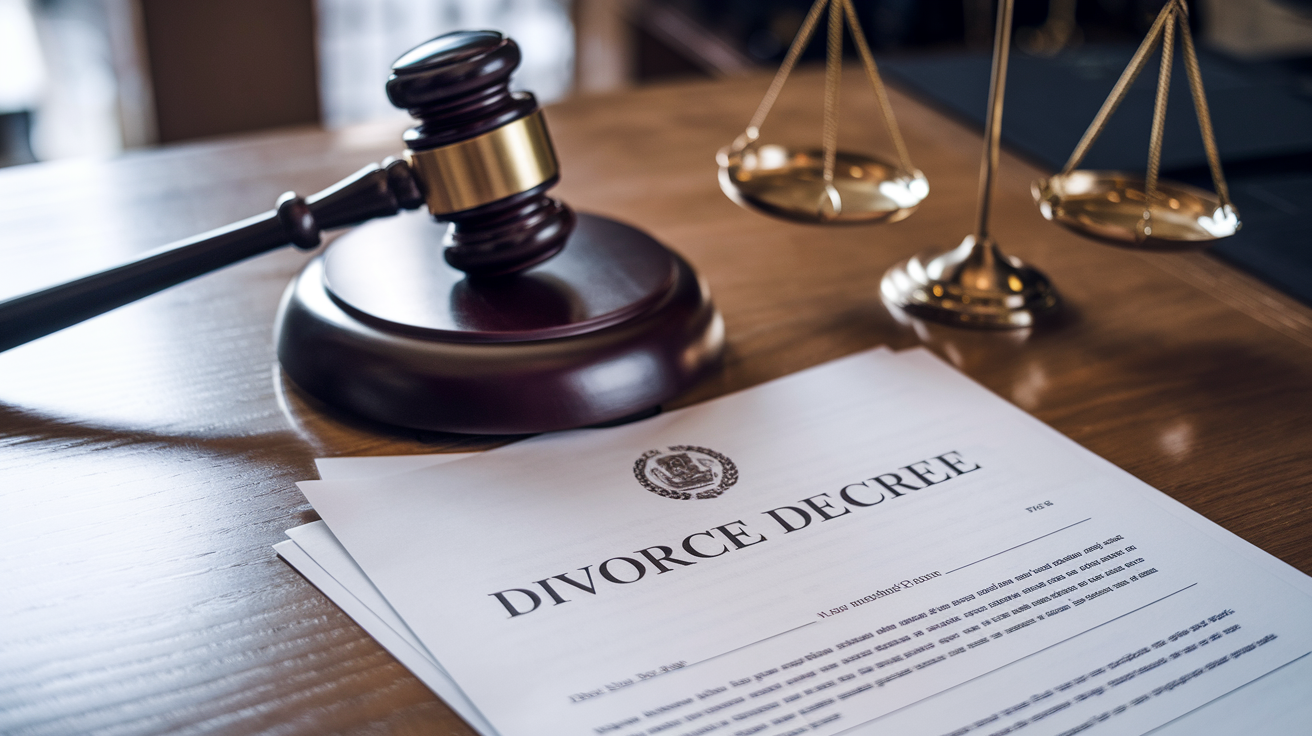Have you felt stuck and frustrated because your ex isn’t following the divorce agreement? Well, it’s quite hard when someone breaks their promises.
Many people face this same problem after divorce – from missed child support payments to ignoring custody schedules.
You have options to protect your rights when your ex doesn’t follow the divorce decree. And, the legal system offers several ways to enforce these agreements.
In this blog, you will find practical steps you can take right now. You will also learn about your legal rights, walk you through the enforcement process, and help you understand when to contact a lawyer.
What is a Divorce Decree

A divorce decree is your official court order that ends your marriage. Think of it as a detailed rulebook that spells out what both you and your ex-spouse must do after the divorce.
The decree includes specific instructions about important matters like money, property, and children.
Your Decree Covers Several Key Areas:
- Property division, including who gets the house, cars, and other items
- Financial responsibilities, such as who pays which debts
- Child custody arrangements and visitation schedules
- Child support payment amounts and due dates
- Spousal support details, if any
- Tax filing status and deductions
- Insurance coverage requirements
Each divorce decree is unique to your situation. The judge signs this document, making it legally binding.
This means both you and your ex must follow these rules, as they’re not just suggestions. And, breaking these rules can lead to serious consequences, including fines or even jail time.
What Happens When Your Ex Doesn’t Follow the Divorce Decree

These below consequences aren’t meant to punish but to encourage compliance with the decree.
1. Financial Penalties
When your ex fails to follow the decree, courts can order them to pay fines. These penalties add up quickly – on top of what they already owe.
For example, if your ex misses child support payments, they might have to pay interest on the overdue amount. The court can also make them cover your legal fees if you need to take them back to court.
2. Wage Garnishment
Courts have the power to take money directly from your ex’s paycheck. This means their employer must send part of their wages to you before they receive their pay.
This often happens with unpaid child support or spousal support. The money goes straight to you, without depending on your ex to make the payment.
3. Property Liens
The court might put a legal claim on your ex’s property when they don’t comply. This means they can’t sell or refinance their house, car, or other valuable items until they follow the decree.
It’s like having a hold on their property until they do what they’re supposed to do.
4. License Suspension
Your ex could lose their driving license, professional license, or even hunting and fishing permits.
Many states use this method to enforce divorce decrees, especially for unpaid child support. They get their licenses back only after they start following the rules again.
5. Contempt of Court
The court can find your ex in contempt for breaking the decree’s rules. This is serious – it means they’re disobeying a court order.
The consequences might include Paying extra fines, Doing community service, Spending time in jail in severe cases, and Having to explain their actions to a judge.
6. Modified Agreements
Sometimes, the court might change parts of the original decree. For example, if your ex keeps interfering with custody schedules, you might have more decision-making power over the children.
The court focuses on agreeing to work better based on how people behave.
7. Credit Score Impact
Your ex’s inability to pay court-ordered support can hurt their credit score.
This makes it harder for them to get loans, rent apartments, open new credit cards, and get certain jobs.
Major Actions to Take When Your Ex Does Not Comply

When an ex-spouse fails to comply with a divorce decree, the other spouse can take several actions to enforce the decree.
| Action | Steps to Take |
|---|---|
| Document Violations | • Keep records of every violation, including dates, details, and proof (messages, photos, videos). |
| Communicate in Writing | • Send calm, clear emails about violations and keep copies for evidence. |
| Consult Your Attorney | • Share documentation and seek legal advice on enforcement. |
| File a Motion for Enforcement | • Submit evidence to the court to request enforcement and penalties. |
| Try Mediation | • Use a mediator to resolve issues without court involvement. |
| Contact Support Agencies | • Report unpaid child support for state enforcement. |
| Request a Show Cause Hearing | • Ask the court to make your ex explain their violations. |
| Modify the Decree | • Request changes to clarify enforcement and add consequences. |
| Follow Your Responsibilities | • Adhere to all decree terms to maintain legal standing. |
| Prioritize Safety | • Take action if threats arise, including police reports and restraining orders. |
Conclusion
When your ex doesn’t follow the divorce decree, you don’t have to feel helpless. The legal system offers many ways to protect your rights and get your ex to comply with the agreement.
From documenting violations to filing court motions, each step brings you closer to a solution.
Remember, the divorce decree isn’t just a piece of paper – it’s a court order that both parties must follow.
Taking action early helps prevent bigger problems later. Start by gathering evidence and reaching out to your attorney for guidance.
Frequently Asked Questions
What Makes a Divorce Decree Invalid?
Missing signatures, fraud, mistakes in key information, or lack of court jurisdiction can make a divorce decree invalid. The court must fix these issues to make it valid again.
Can a Divorce Decree Be Revoked?
A divorce decree can’t be revoked once it’s final. However, you can appeal the decision within a limited time if there are legal errors or new evidence.
Can a Divorce Decree Override a Will?
Yes, a divorce decree can override parts of a will that involve your ex-spouse. After divorce, any gifts to your ex in your will usually become void automatically.








